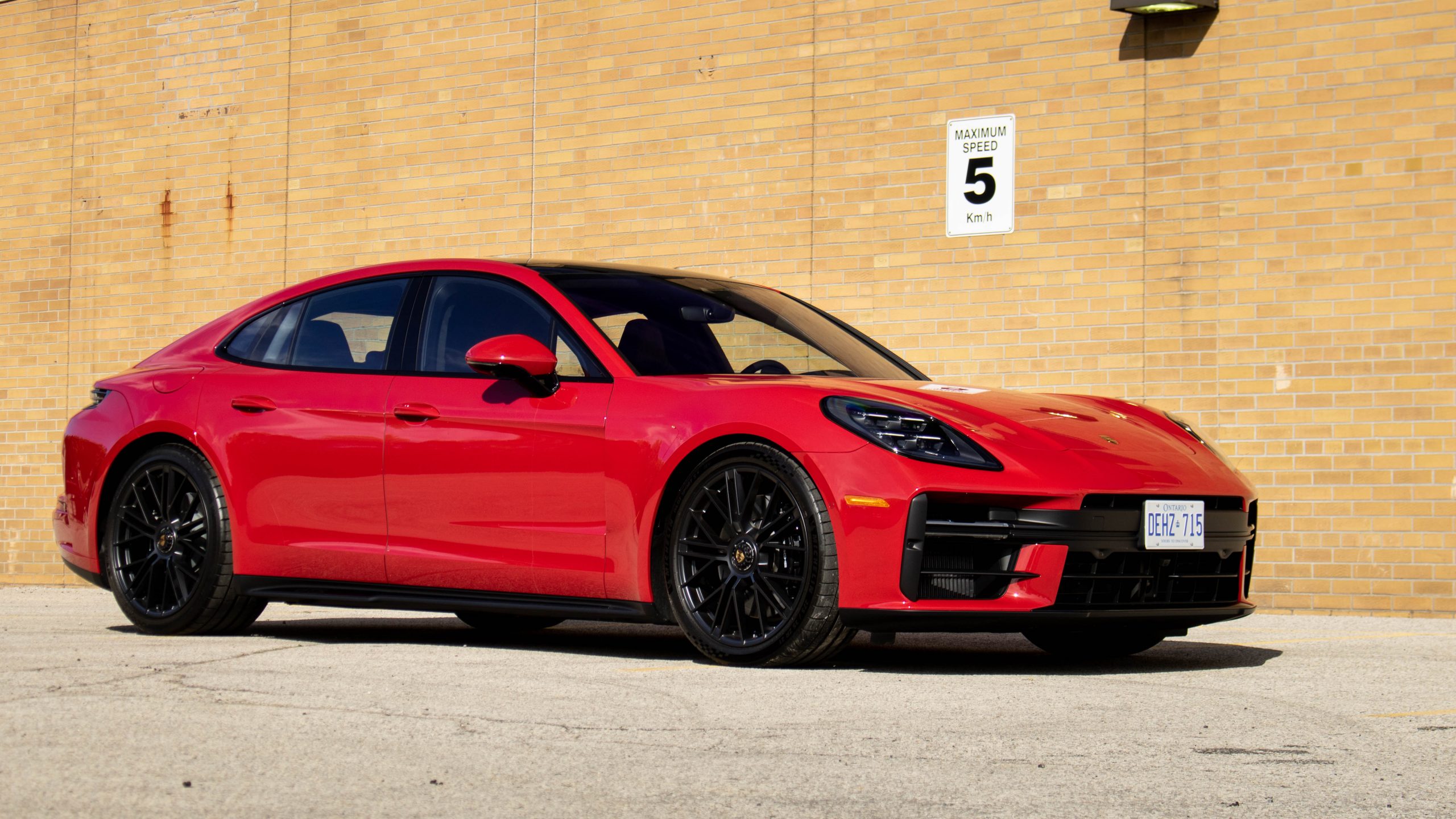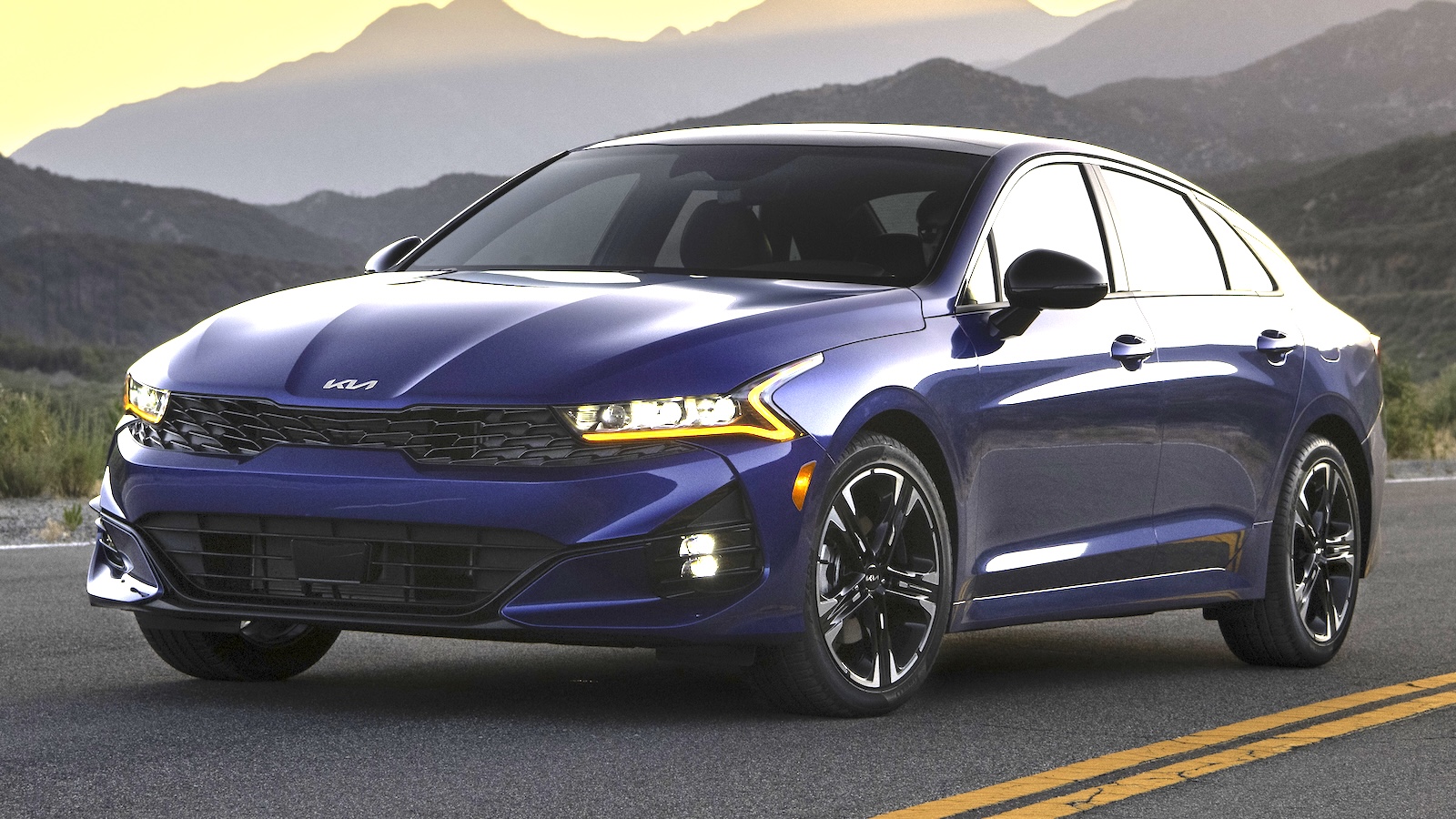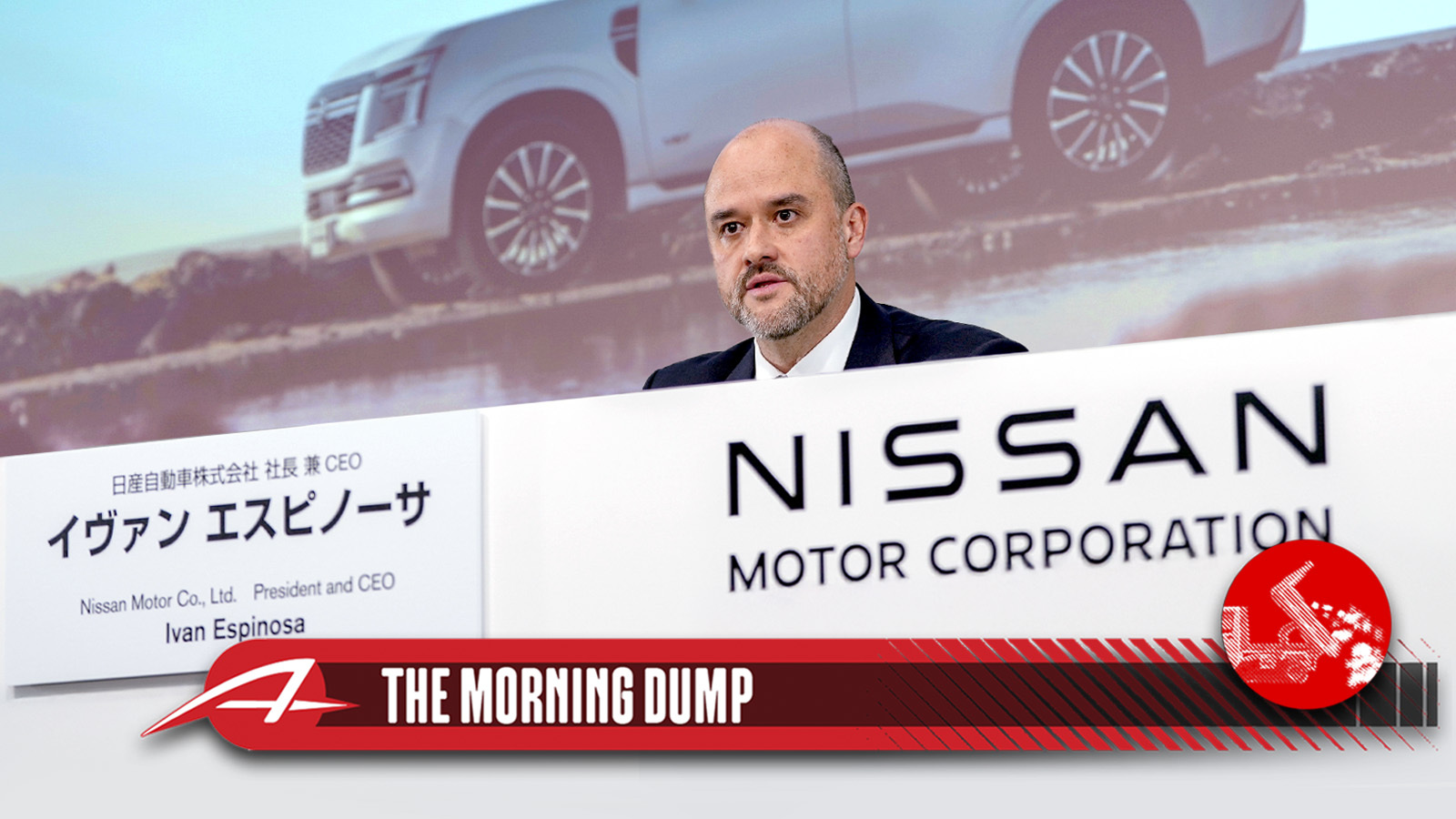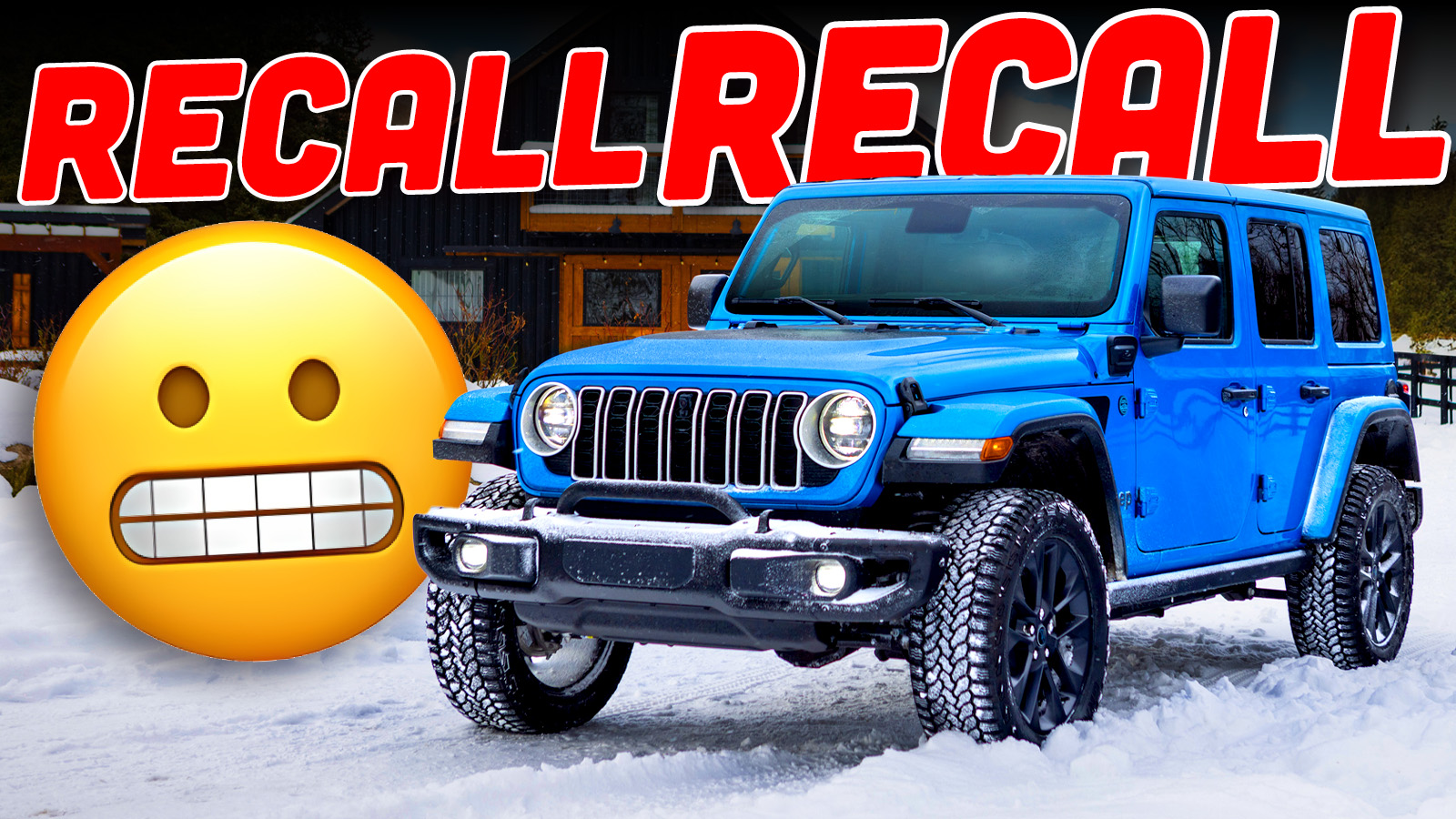In business as in life, things often get uglier before they get better. A cut will scab before it heals, minor catastrophes seem to pour before calm washes over — those sorts of things. In this case, getting worse means Nissan just announced its first quarterly operating loss in years, and the automaker is forecasting more trouble on the way during its current turnaround phase.
At the same time, Porsche is reportedly in an actual restructuring phase, GM dropped the first teasers of the next-generation Chevrolet Bolt last night, and one understandably dissatisfied customer of a Kia dealership in Ohio has found a smart and legal way to get one over on the business.
Welcome back to The Morning Dump, our daily round-up of bite-sized tidbits of car news that you oughta know about. Matt’s out this week on vacation, so I’ve been given the reins. Grab yourself a coffee, let’s get into it.
Nissan Takes An L

It’s been a rough few years for Nissan, and things are going to get worse before they get better. The company’s financial results for the first quarter of its current fiscal year are now out, and Nissan just posted its first quarterly operating loss in more than four years. It’s a notable change from last quarter, on which the company wrote “In the fourth quarter of fiscal year 2024, consolidated net revenue was 3.490 trillion yen, consolidated operating profit was 5.8 billion yen, and operating profit margin was 0.2%.” So how bad is this financial downturn? As the automaker wrote in a statement:
In the first quarter, Nissan recorded global sales of 707,000 units and consolidated net revenue of 2.7 trillion yen. While improvements in product mix and reductions in fixed costs helped mitigate losses—resulting in a smaller-than-expected operating loss of 79.1 billion yen compared to the earlier forecast of 200 billion yen—the company continued to face headwinds. These included lower sales volumes, adverse exchange rate movements, and the impact of U.S. tariffs. Consequently, the net loss for the period amounted to 115.8 billion yen.
At current exchange rates, that works out to an operating loss of $530.9 million and a net loss of $777.9 million. It’s a smaller loss than expected, but it’s a big contrast to the first quarter of the previous fiscal year, in which Nissan actually turned a profit. It’s also likely not a one-off bad quarter, as the company released guidance that details a predicted second-quarter operating loss of 100 billion yen or $671.1 million at current exchange rates. It really is a make-or-break moment for Nissan, as CEO Anthony Espinosa hinted at in a statement:
These results serve as a reminder of the urgency behind our Re:Nissan recovery plan. Over the past quarter, we’ve taken decisive first steps—cutting costs, redefining our product and market strategy, and strengthening key partnerships. We must now go further and faster to achieve profitability. Everyone at Nissan is united in delivering a recovery that will ensure a sustainable and profitable future.
When was the last time Nissan posted a quarterly operating loss? Well, it was the fourth quarter of fiscal year 2020. By the time the first quarter of fiscal year 2021 came to a close, things had turned back to profit, as a media release on that latter period states:
Supported by favorable market conditions, profitability improved as Nissan continued to improve the performance in the U.S. market and quality of sales in each market, through the solid implementation of Nissan NEXT transformation plan. Nissan also made effective use of its inventory and conducted strategic production during the first quarter, which minimized the impact of the semiconductor shortage and contributed to operating profit.
So what comes next? Well, in addition to reducing headcount and closing factories, Nissan has stated it’s working on thousands of cost-cutting ideas. Four thousand of them, in fact, with 1,600 ready to go. A honing of the product portfolio is also in the works, all in the aim of restoring profitability by the end of this fiscal year. Will Nissan meet this target? Well, it kind of has to, doesn’t it? Red ink can’t go on forever, because if you lose enough money, there’s this thing called bankruptcy protection. Nobody wants to end up there, just ask Chrysler.
It’s Make-Or-Break Time For Porsche

Speaking of tight financial situations, Porsche just slashed its annual forecast for the second time in the past few months. The 15 percent tariff rate on vehicles imported to America from Europe definitely plays a role, but it’s not the only reason why year-over-year operating profit fell from €3.061 million to €1.07 million. Headwinds including an 11.1 percent drop in unit sales and a reduction in sales margin from 15.7 percent to 5.5 percent also played a role, and the result is a company that’s reportedly taking big measures. As Manager Magazine reports, at least if Google Translate is accurate:
Porsche CEO Oliver Blume (57) said his company continues to face significant challenges worldwide. “This is not a storm that will pass. The world is changing massively – and, above all, differently than expected just a few years ago.” Therefore, the company is being restructured. Porsche estimated the cost of this for the full year at 1.3 billion euros.
Whoa, restructuring? Yeah, this isn’t just a case of taking a bad quarter or two on the chin, Porsche is reportedly in the midst of making what seem like survival measures. As it turns out, going all-in on electric cars probably wasn’t the right call, at least in the luxury performance segment, and it sure seems like it’ll be the workers who’ll suffer. As Manager continues:
Because demand for electric cars is growing more slowly than initially expected, Porsche is investing in, among other things, the development of new combustion engine models and restructuring its battery activities. This is also leading to job cuts. Negotiations on a second austerity package will begin in the second half of the year. Blume prepared the workforce for further cuts in a letter last week.
Here’s my take: Not re-engineering the 718 Cayman and Boxster to comply with European GSR2 seems like a lapse in judgement as not only does the combustion-powered mid-engined sports car satisfy a base of purists who think the 911’s grown too big, it also keeps the door open on a more affordable Porsche sports car, the sort of package that can’t be 100 percent emotionally replaced with a now-delayed electric model like Porsche plans. Plus, 23,670 global sales last year is nothing to sneeze at when you consider that the vast majority of 718 models went off-sale in Europe. Speaking of entry level models, while momentum is slowly building on the electric Macan, a new, likely electrified combustion Macan suitable for global markets would fill a significant hole in the lineup, what with the current gasoline-powered Macan having gone off sale in Europe. A strong electric lineup is important, but putting all those eggs in one basket seemed foolish, especially considering the headwinds building in China for years that saw America reclaim its place as Porsche’s largest market in 2024.
However, it’s not like Porsche hasn’t been in a tight spot before. From the mid 1980s to the early 1990s, a strong Deutsche Mark and an economic bubble popping in America led to mounting losses, with Porsche posting a loss of 240 million Deutsche Marks at the end of 1992. Thanks to an aggressive strategy of cost-cutting, product streamlining, and hopping on the SUV trend at just the right time, the fortunes of the firm rebounded hard enough that by the late 2000s, it was in a position to attempt a hostile takeover of Volkswagen.
Oh Hi, Bolt
Put your hands up if you’ve been waiting for the second-generation Chevrolet Bolt. Late in its production run, the first-generation model was a bonafide bargain, and judging by the old Bolt’s success, there are definitely people out there who’ve been waiting for another affordable EV for North America. Well, Chevrolet just teased the new Bolt on Instagram, and while it’s carrying some nice upgrades, it also looks almost suspiciously familiar.
For one, behind the charging flap in the left front fender sits a NACS port, which shouldn’t be surprising considering the industry-wide shift to a Tesla-style connector in North America but is nice to see in an entry level EV. However, taking a closer look at the handful of styling cues revealed, it’s possible the new Bolt shares more with the old Bolt EUV than expected. For one, the cut line for the daytime running lights and the trim insert between the fender and the hood look awfully familiar, as does the shape of the greenhouse, and the rear door handles. It’s possible GM’s using bits of the old body, but if that keeps things cheap, I’m sure not complaining.
Regardless, expect to learn a whole lot more relatively soon. Chevrolet stated in the Instagram post “More this fall,” meaning we’ll be keeping our eyeballs out for America’s latest affordable EV during pumpkin spice season. Pricing isn’t expected to move the needle much on the old Bolt EUV’s $28,795 starting price, so if GM could keep it under $30,000, that would be grand.
It Hurts When IP

A Kia dealership in Ohio has reportedly learned a hard lesson about intellectual property rights and why it’s important to not upset anyone with an upper hand in that department. As Automotive News reports in their story titled “A dealership took her car; she responded by taking their name,” a deal-gone-wrong on a K5 sedan has resulted in a former customer snapping up the dealership’s branding. From the news site:
In February 2024, [this person[ went to [the Kia dealership] to purchase a vehicle, deciding on a 2022 Kia K5, according to court records. Before leaving the dealership, [they] signed several documents, including a retail buyers order. The dealership’s finance and insurance manager put her electronic signature on an arbitration agreement.
Although Global Lending Services initially provided preliminary approval to [them], a few weeks later they concluded the “available information regarding [their] income was not sufficient to substantiate a loan in the requested amount,” according to court records. [Their] car was repossessed by the dealership March 29, 2024, while [this person] was at work.
Well, this, if true, seems unethical. Why did the finance company offer preliminary approval before deciding it couldn’t offer the person a loan? Why did the dealership let them drive the car off the lot? Well, it’s a practice called spot delivery, and for shoppers right on the line of potential approval, it sucks. However, instead of chalking it up as a loss, the person reportedly found a clever legal option to sort-of get even. From Automotive News:
While evaluating her legal options, [the person] discovered the Ohio Secretary of State canceled the registration for the name [of the dealership] after [the dealership group] failed to submit a renewal application. The group operates seven dealerships in northeast Ohio, including three Kia dealerships, three Hyundai dealerships and a Cadillac dealership.
[The person] registered [the dealership name] in her own name and sent a cease and desist letter to the group because the dealership name was now registered to her.
Lol, lmao even. Is this the funniest possible outcome? Possibly, but sometimes you just can’t wait for karma to come around and have to create it yourself.
What I’m Listening To While Writing TMD
Another frantic morning, another pump-up song. It’s “sweet.” by Static Dress.
The Big Question:
With the EV tax credit as good as dead in America, how are we feeling about the new Chevrolet Bolt?
Top graphic image: Nissan








What is supricing to me is that Nissan has been profitable :O. I’ve been under impression that it’s been making a loss for quite some time.
I admire the lady who registered the auto dealer’s name out from under them. Dealerships are so universally reviled (at least by me, in my universe). I don’t know what it’ll cost her to keep the registered name herself, but if it’s a managable sum, she ought to do so indefinitely and make the dealership change all its signage, branding, stationary (assuming they even use stationary anymore) etc…
My field of fucks is quite barren regarding the Bolt, so I have none to give. Credit or no credit. I have never owned a GM product, and I have no intention of ever starting, they have never impressed me.
Grabbing that dealership’s name is *epic*. Bravo! Do please followup on that one.
Porsche, meh, whatever. Dead to me. I like their old stuff far better than anything they have made recently, and feel like I dodged a bullet by not ordering that Cayman back in 2019.
More here. I’m not sure why Thomas redacted the name of the dealership; R&T isn’t shy about using it.
Oh, I saw all that already – I want to know what the final outcome of the case is. It’s all been punted back to the trial court at this point.
Yes, I can’t help gunning for her, but maybe the dealership can keep the case in litigation long enough for her claim to run out. I think maybe you have to use the name for a legitimate business or product within a certain time to retain the rights to it?